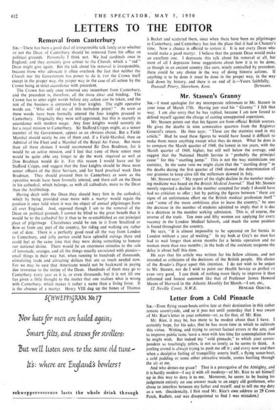LETTERS TO THE EDITOR
Removal from Canterbury
Sts,—There has been a good deal of irresponsible talk lately as to whether or not the Dean of Canterbury should be removed from his office on political grounds. Personally I think not. We had cardinals once in England, and they certainly gave colour to the Church, which a " red " Dean might give again. But the talk about his removal is irresponsible, because those who advocate it often overlook the fact that neither the Church nor the Government has power to do it, ror the Crown itself except in the proper way, the proper way in the case of all action by the Crown being in strict accordance with precedent.
The Crown has only once removed any incumbent from Canterbury, and the precedent is, therefore, all the more clear and binding. The Crown has to utter eight words before any action can be taken, and the rest of the business is entrusted to four knights. The eight operative words are, " Who will rid me of this turbulent priest? " As soon as these words have been formally uttered the four knights proceed to Canterbury. Originally they were self-appointed, but this is scarcely in accordance with modern usage. Any four knights would scarcely do for a royal mission to Canterbury. Sir Stafford Cripps might, as a senior member of the Government, appear as an obvious choice. But a Field- Marshal should surely be one of them and, if a Field-Marshal, then an Admiral of the Fleet and a Marshal of the Royal Air Force. But more than all these choices I would recommend Sir Don Bradman, for it would be an active mission, and I feel that cone of these senior men would be quite able any longer to do the work required as well as Don Bradman would do it. For this reason I would leave out Sir Stafford Cripps, and suggest that the four knights should be these most senior officers of the three Services, and for hard practical work Don Bradman. They should proceed then to Canterbury as soon as the operative words have been formally uttered, and there call on the Dean in his cathedral, which belongs, as with all cathedrals, more to the Dean than the Archbishop.
Having dealt with the Dean they should bury him in the cathedral, which by being provided • once more with a martyr would regain the position it once held when it was the object of annual pilgrimages from all over England. And, opposed though I am to the removal of the Dean on political grounds, I cannot be blind to the great benefit that it would be to the cathedral for it thus to be re-established as our principal place of pilgrimage. Charabancs could be run to it from Stratford or . Bow or from any part of the country, for riding and walking are rather out of date. There is a perfectly good road all the way from London to Canterbury, and jolly parties could have splendid outings there and could feel at the same time that they were doing something to honour our national shrine. There would be an enormous stimulus to the sale of lemonade, oranges, and all the things usually associated with picnics— small things in their way but, when running to hundreds of thousands, stimulating trade and attracting dollars that are so much needed now. For we may be sure that Americans would not be backward in paying due reverence to the shrine of the Dean. Hundreds of them may go to Canterbury every year as it is, or even thousands, but it is not till one has given a little thought to the matter that one realises what is wrong with Canterbury, which makes it rather a name than a living force. It is the absence of a martyr. Henry VIII dug up the bones of Thomas a Becket and scattered them, since when there have been no pilgrimages to Canterbury, and Canterbury has lost the place that it had in Chaucer's time. Now a chance is offered to restore it. It is not every Dean who would make a good martyr. I believe that the present Dean would make an excellent one. 1 deprecate this talk about his removal at all, but most of all I deprecate loose suggestions about how it is to be done, as though in an ancient country like ours, wisely controlled by precedent, there could be any choice in the way of doing historic actions. If anything is to be done it must be done in the proper way, in the way laid down by history, and there is an end of it.—Yours faithfully,






































 Previous page
Previous page